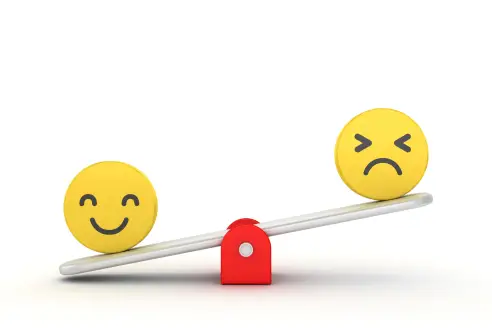We are usually assessed based how well we have done. Whether via examinations in school or performance appraisals at work, we are given points for the things we got right and achievements we have accomplished.
Yet outside of these formal assessment structures, we often operate on a deficit or a demerit point basis in how we perceive experiences in our own lives. We seldom look for and give ourselves or others points for things that were done well nor appreciate all the things, small or big, that went well.
Instead, we are hypersensitive to the things that did not go well or the mistakes made.
This Negative Bias effect is inherent in all of us and was discovered by the psychologists Paul Rozin and Edward Royzman in 2001. This bias means that we are more sensitive to negativity and are a lot more concerned about negative things than positive things.
We also make decisions based not on achieving something good but on avoiding something bad. Why is this so? The amygdala in the brain, which regulates emotion and motivation, uses about two-thirds of its neurons to detect danger and bad news.
This might have been useful back when we were hunter gatherers as being hyper alert for signs of danger or bad things likely kept us alive. However, this hinders progress in our lives today as we spend more time and effort worrying about what is wrong and what could go wrong, rather than build on our strengths and what is currently actually going well.
This also creates stress and anxiety which might not be a true reflection of reality. For instance, we might be getting along fine with peers at school or work and we would likely not think much of this and relegate it to the usual humdrum normalities of life at school or work.
However, when a conflict incident arises with our peers, we will be consumed by feelings, thoughts and worries about the conflict, noting how the person is “always difficult like that” and if the conflict remains unresolve for a while we might lose hope that it’ll ever be resolvable.
Yet we do not realise that prior to the conflict incident, we might have spent many days or weeks getting on fine with the peers in question!
How then should we perceive our experiences?
A simple approach is to internalise the world view that “Exceptions Deserves Attention”. What this means is we recognise that problems are never occurring all the time. There might be times in the past or the future when the problem didn’t occur or when the problem was less severe. There will always be ups complementing the downs in our lives.
When we realise that exceptions will always occur, we can choose to do four things:
First, we look for such exceptions or times in the past relevant to the current challenge when things were ok or better. This is not an attempt to simply feel better but a deliberate effort to see things in a balanced and holistic manner.
We will understand that mistakes are not made literally every second of our lives, or that we are always in a bottomless pit of tragedies. When we see things in perspective, we will have less of “it is always like this” thoughts and more of “just as times were better in the past, so will times be in the future” thoughts.
Looking for and recognising past exceptions also serve as mental anchors or reference points for us. As we navigate the current challenges, such mental anchors enable us to have some clarity on how we want things to be better, and to let us be more conscious in noticing signs of improvement.
Second, in recognising good past exceptions, we can appreciate what contributed to make these moments happen. These could be strengths, abilities, personal characteristics or things we did. This leads to greater confidence that we can overcome the current challenges.
Third, we can learn from past exceptions to see what is relevant and applicable for the current challenges. Our past experiences are like a long series of experiments and are rich in valuable insights on what works. We want to mine past exceptions for insights on situations, ourselves or others to discover possible ideas on how to move forward.
Fourth, we can also recognise that in spite of going through current bad experiences, we are managing to cope in some way. We want to recognise and appreciate the specific ways of coping that are working well for us, and our abilities and strengths that enabled us to cope. This will create more self-awareness of what we are doing and can do more of in helping ourselves to cope.
Reframing for good past exceptions is not about ignoring the bad experiences. We are not looking at the world through rose-tinted lenses and pretending that everything is fine.
Reframing for good past exceptions is instead a deliberate decision to recognise that there are two sides of the coin and while we look at the bad experiences, we also recognise and value the good experiences as well. This leads to an additional benefit which is our beliefs tend to shape our outcomes (self-fulfilling prophecy).
If we focus only on the bad experiences, it will likely perpetuate further and find ourselves stuck in a downward negative spiral. However, if we focus on good past exceptions, we will likely believe we have what it takes to improve things and act accordingly and create the outcome we want inadvertently.
Focusing on good past exceptions enables us to leverage the self-fulfilling prophesy effect , discovered by Robert Merton in 1948 , in a productive way to steer us towards achieving better outcomes.







